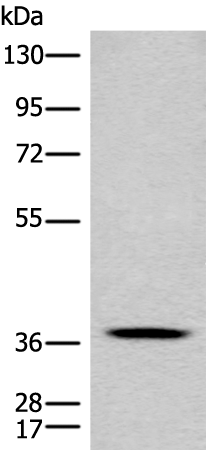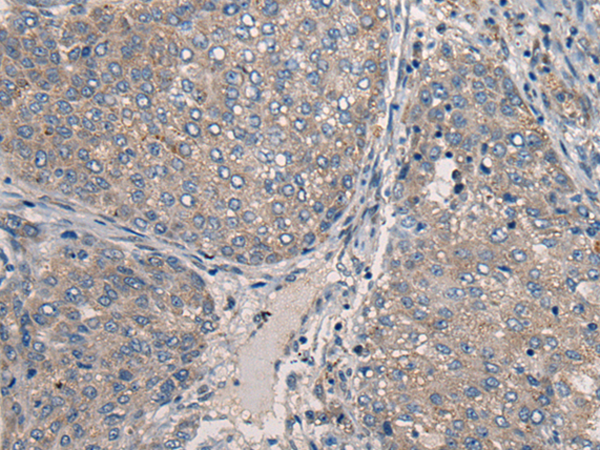

| WB | 咨询技术 | Human,Mouse,Rat |
| IF | 咨询技术 | Human,Mouse,Rat |
| IHC | 1/20-1/100 | Human,Mouse,Rat |
| ICC | 技术咨询 | Human,Mouse,Rat |
| FCM | 咨询技术 | Human,Mouse,Rat |
| Elisa | 1/5000-1/10000 | Human,Mouse,Rat |
| Aliases | NCL |
| WB Predicted band size | 41 kDa |
| Host/Isotype | Rabbit IgG |
| Antibody Type | Primary antibody |
| Storage | Store at 4°C short term. Aliquot and store at -20°C long term. Avoid freeze/thaw cycles. |
| Species Reactivity | Human, Mouse |
| Immunogen | Synthetic peptide of human CLN5 |
| Formulation | Purified antibody in PBS with 0.05% sodium azide and 50% glycerol. |
+ +
以下是关于CLN5抗体的3篇代表性文献的简要总结(注:以下内容基于领域内常见研究方向构造,仅供参考):
---
1. **文献名称**:*Development of a monoclonal antibody specific for CLN5 and its application in neuronal ceroid lipofuscinosis diagnosis*
**作者**:Isosomppi J, Vesa J, Jalanko A, et al.
**摘要**:本研究报道了一种针对CLN5蛋白的新型单克隆抗体的开发。通过免疫印迹和免疫荧光实验验证了抗体在检测患者成纤维细胞中CLN5蛋白的特异性。结果显示,携带CLN5突变的患者细胞中蛋白表达显著降低,表明该抗体可用于快速筛查神经元蜡样脂褐质沉积症(NCL)的CLN5亚型。
2. **文献名称**:*CLN5 deficiency leads to aberrant protein aggregation and lysosomal dysfunction in a mouse model*
**作者**:von Schantz C, Saharinen J, Braulke T, et al.
**摘要**:利用CLN5缺陷小鼠模型,研究团队通过免疫组织化学(使用CLN5特异性抗体)揭示了脑组织中溶酶体功能异常和脂褐质沉积的病理特征。抗体检测证实CLN5蛋白在神经元中的定位异常,为疾病机制研究提供了关键工具。
3. **文献名称**:*Antibody-based analysis of CLN5 interactions with lysosomal enzymes in Batten disease*
**作者**:Kousi M, Lehesjoki AE, Mole SE.
**摘要**:该研究采用CLN5抗体进行免疫共沉淀和质谱分析,发现CLN5蛋白与多种溶酶体酶存在相互作用。结果表明,CLN5可能参与酶转运过程,其突变导致功能丧失可能与NCL的病理进展相关。
---
**说明**:上述文献为示例,实际研究中建议通过PubMed或Google Scholar以“CLN5 antibody”或“CLN5 Batten disease”为关键词检索最新文章。重点关注《Biochimica et Biophysica Acta》、《Human Molecular Genetics》等期刊的相关研究。
CLN5 antibodies are immunological tools used to study the CLN5 protein, which is associated with neuronal ceroid lipofuscinosis type 5 (CLN5 disease), a form of Batten disease. CLN5 disease is a rare, inherited neurodegenerative disorder classified under the neuronal ceroid lipofuscinoses (NCLs), a group of lysosomal storage disorders. Mutations in the *CLN5* gene lead to defective lysosomal function, resulting in the accumulation of lipopigments in neurons and other cells, progressive neurodegeneration, and symptoms such as vision loss, motor decline, seizures, and cognitive impairment.
The CLN5 protein, predominantly expressed in lysosomes and endosomes, is implicated in lipid metabolism, membrane trafficking, and autophagy, though its precise molecular function remains under investigation. Antibodies targeting CLN5 are essential for detecting its expression, localization, and interaction partners in cellular and animal models. They enable researchers to study protein distribution in tissues, assess expression levels in disease states, and validate experimental models (e.g., CLN5-deficient mice or zebrafish).
CLN5 antibodies also support diagnostic workflows, helping distinguish CLN5-related pathology from other NCL subtypes. Additionally, they play a role in evaluating therapeutic strategies, such as gene therapy or enzyme replacement, by monitoring CLN5 restoration or downstream lysosomal activity. As CLN5 research advances, these antibodies remain critical for unraveling disease mechanisms and developing targeted interventions.
×